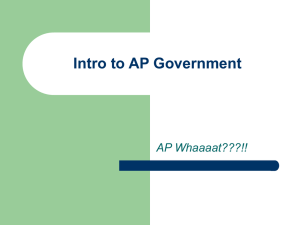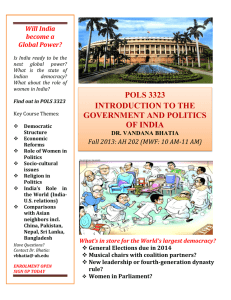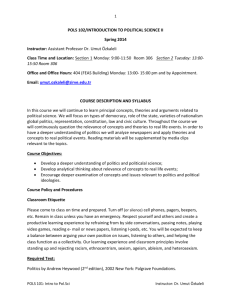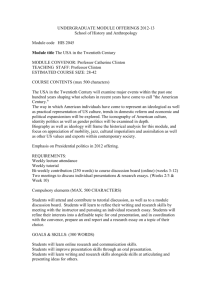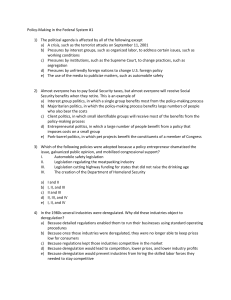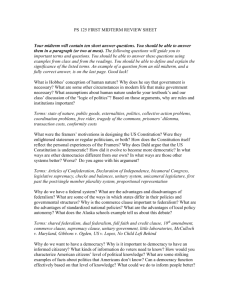POLS 2170 (3,2,1)
advertisement
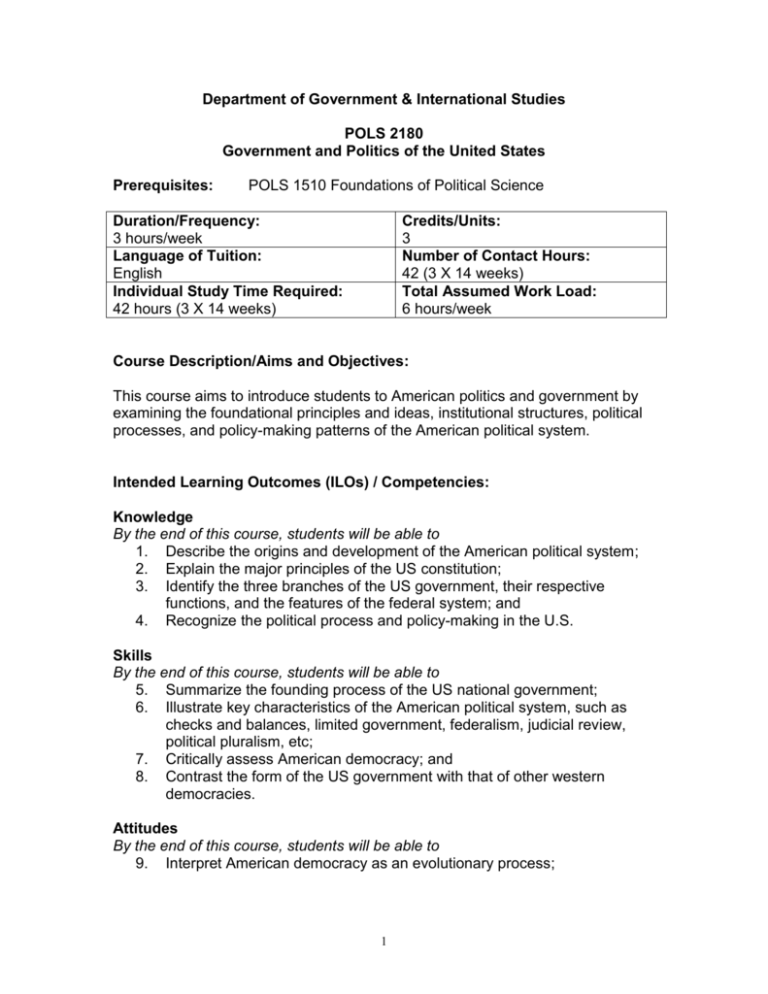
Department of Government & International Studies POLS 2180 Government and Politics of the United States Prerequisites: POLS 1510 Foundations of Political Science Duration/Frequency: 3 hours/week Language of Tuition: English Individual Study Time Required: 42 hours (3 X 14 weeks) Credits/Units: 3 Number of Contact Hours: 42 (3 X 14 weeks) Total Assumed Work Load: 6 hours/week Course Description/Aims and Objectives: This course aims to introduce students to American politics and government by examining the foundational principles and ideas, institutional structures, political processes, and policy-making patterns of the American political system. Intended Learning Outcomes (ILOs) / Competencies: Knowledge By the end of this course, students will be able to 1. Describe the origins and development of the American political system; 2. Explain the major principles of the US constitution; 3. Identify the three branches of the US government, their respective functions, and the features of the federal system; and 4. Recognize the political process and policy-making in the U.S. Skills By the end of this course, students will be able to 5. Summarize the founding process of the US national government; 6. Illustrate key characteristics of the American political system, such as checks and balances, limited government, federalism, judicial review, political pluralism, etc; 7. Critically assess American democracy; and 8. Contrast the form of the US government with that of other western democracies. Attitudes By the end of this course, students will be able to 9. Interpret American democracy as an evolutionary process; 1 10. Appraise social and historical impacts on the formation of the US national government; 11. Reflect on the pros and cons of the American political system; and 12. Question and reflect on the political philosophy on which the US government was founded. Course Content: 1. Foundations, Ideas, and Principles 1) The Founding 2) The Making of the Constitution 3) Constitutional Principles (separation of powers and checks and balances, federalism, limited government, and judicial review) 2) Political Institutions 1) Congress 2) Presidency 3) Judiciary 4) Bureaucracy 3) Political Process 1) Political Parties and Interest Groups 2) Public Opinion 3) Participation, Voting, and Election 4) Public Policy 1) Economic and Regulatory Policy 2) Social Policy 3) Foreign Policy Teaching & Learning Activities (TLAs): TLAs 1. Lectures The lectures will examine the foundational principles and ideas, institutional structures, political processes, and policy-making 2 ILOs addressed 1 to 12 patterns of the American political system. 2. Tutorial discussions/ Presentations Tutorial sessions will be held to discuss the pros and cons of the American political system. 5 to 12 Assessment Methods (AMs): AMs Weighting Active participation in tutorial discussions throughout the semester 30% ILOs addressed 1 to 12 Term paper 20% 1 to 11 Final examination 50% 1 to 11 3 Description of Assessment Tasks Students must attend all tutorials and try to be punctual. All students are expected to read the relevant readings before the tutorials. They should ask questions, give comments to the presenters, and participate in the discussion. Students have to submit a term paper to identify and summarize main aspects of the political ideologies involved in the American politics. The questions will be essaytype questions testing students’ understanding of the foundational principles and ideas, institutional structures, political processes, and policymaking patterns of the American political system. References: L. Berman & B. Murphy, Approaching Democracy. Katznelson, Ira., The Politics of Power: a critical introduction to American Government. Belmont, Calif: Wadsworth/Thomson Learning. 2002. Bishop, Donald M, ed., Living Documents of American History. Hong Kong: 今日世 界出版社. 1987. Dupuis, Martin. and Boeckelman, Keith., Barack Obama, the New Face of American Politics, Westport, Conn: Praeger. 2008. *More readings will be assigned during the class Syllabus prepared by: Prof. Feng CHEN / September 2010 4
